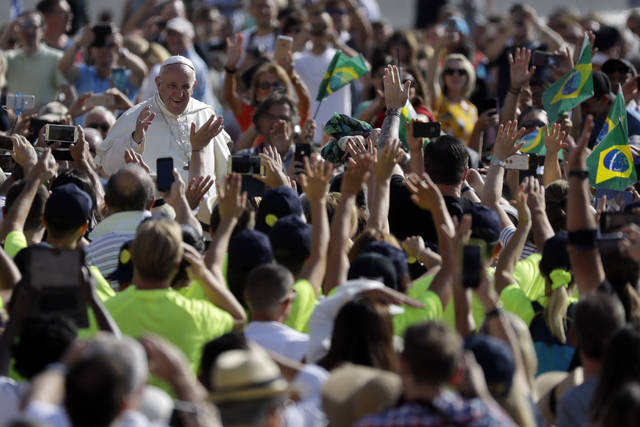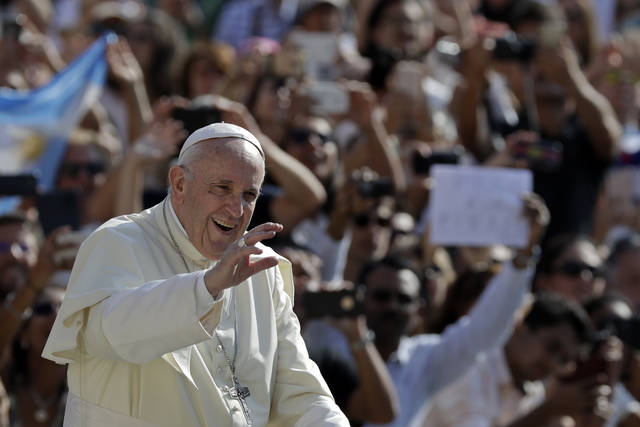VATICAN CITY — The author of the bombshell accusation that Pope Francis covered up sex abuse broke his silence Wednesday and insisted he didn’t act out of revenge or anger but out of love for the Catholic Church.
In comments carried on the blog of Italian journalist Aldo Maria Valli, Archbishop Carlo Maria Vigano said he was “serene and at peace” after publishing his declaration, albeit saddened by subsequent attempts to undermine his credibility.
Vigano’s accusations published Sunday — that Francis and before him Pope Benedict XVI knew of ex-Cardinal McCarrick’s sexual preying on seminarians — have thrown Francis’ papacy into crisis. They have undermined the pontiff’s claim of having “zero tolerance” for sex abuse and have fueled the left-right ideological divide that has long split the church and intensified under Francis.
Vigano, the retired Vatican ambassador to the U.S., said Francis should resign for what he called his complicity in the McCarrick scandal, though Vigano’s denunciations also implicate Benedict and a host of high-ranking U.S. and Vatican officials going back two decades.
“I spoke out because by now the corruption has arrived at the top of the church hierarchy,” Vigano was quoted as saying.
Valli, a Vatican expert with state-run RAI television, has said that Vigano twice came to his home to consult with him in the weeks leading up to publication of his bombshell. Another conservative Italian journalist, Marco Tosatti, actually helped Vigano rewrite and edit the 11-page document, and arranged for its publication in Italian, English and Spanish-language media.
In the Valli interview, Vigano revisited old Vatican controversies that marked his career and explained that he decided to go public now because the denunciation he had made confidentially to three cardinals in 2012 never was acted on.
It was a reference to the 2012 investigation commissioned by Benedict into the leaks of confidential documents that became known as the “Vatileaks” affair. Benedict’s then-butler, Paolo Gabrieli, was convicted of stealing the papers and leaking them to an Italian journalist who published them in a blockbuster book.
Vigano, long a divisive figure in the Vatican, figured in the investigation because some of his letters lamenting his transfer to the Washington embassy were leaked.
While the investigation’s outcome has never been revealed, its findings were so important that in their first meeting after Francis’ March 13, 2013 election, Benedict and the new pope were seen sitting across one another at the papal summer residence with an enormous white box between them: It was the documentation from the investigation, being handed off from one pope to the next.
Vigano said the information he provided Benedict’s cardinal investigators was similar to what he wrote in his declaration.
“I always thought that the church hierarchy would have been able to find within itself the resources to heal the corruption,” he told Valli.
“It would have been sufficient to follow my report and the summary of my testimony before the three cardinals to start doing a bit of cleanup in the Curia.”
Francis has deflected comment on Vigano’s denunciation, telling reporters that “the text speaks for itself” and that he won’t say a word about it.
Francis made no reference to it at his general audience Wednesday, his first Vatican appearance since the accusations were made.
In recounting his recent trip to Ireland, Francis lamented how Irish church authorities had failed to respond to the crimes of priests who abused. He omitted from his remarks a line in his prepared text noting how he had prayed in Ireland for the Virgin Mary to intervene to give the church strength to “firmly pursue truth and justice” to help victims heal.
U.S. bishops, as well as rank-and-file Catholics, have called for an independent investigation to find out who knew about McCarrick’s misdeeds, and how he was able to rise through the ranks even though it was an open secret that he regularly invited seminarians to his New Jersey beach house and into his bed.
Francis last month removed McCarrick as a cardinal and ordered him to live a lifetime of penance and prayer after a U.S. church investigation determined that an allegation he groped a teenage altar boy in the 1970s was credible.



